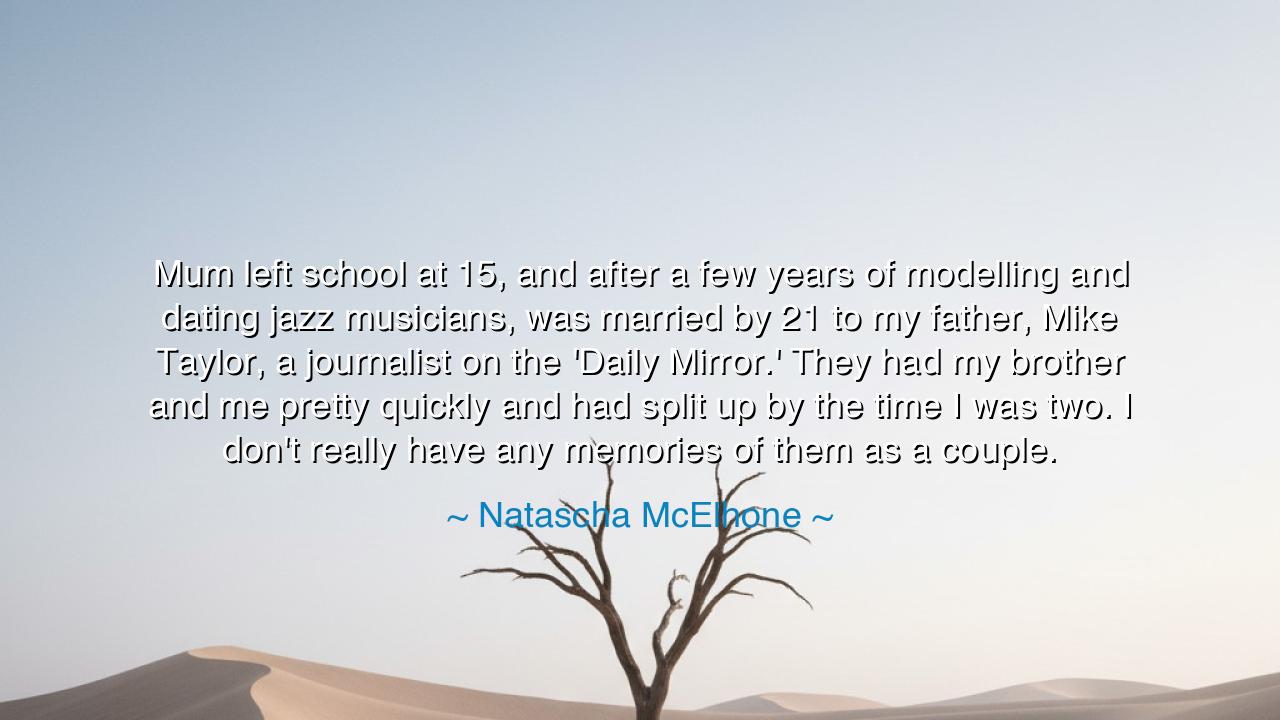
Mum left school at 15, and after a few years of modelling and
Mum left school at 15, and after a few years of modelling and dating jazz musicians, was married by 21 to my father, Mike Taylor, a journalist on the 'Daily Mirror.' They had my brother and me pretty quickly and had split up by the time I was two. I don't really have any memories of them as a couple.






The words of Natascha McElhone—“Mum left school at 15, and after a few years of modelling and dating jazz musicians, was married by 21 to my father, Mike Taylor, a journalist on the ‘Daily Mirror.’ They had my brother and me pretty quickly and had split up by the time I was two. I don’t really have any memories of them as a couple”—speak softly yet profoundly of the fragility of human beginnings. In this memory, we glimpse the eternal truth that life often unfolds in haste, before wisdom has yet found its footing. Youth, with its fire and promise, moves swiftly; it builds, loves, dreams—and sometimes, it breaks before it fully understands what it is building. This is the song of many lives: the rise and the fading of love before the eyes of a child too young to remember its warmth.
In the cadence of these words, one hears not bitterness, but observation born of distance—a daughter gazing back through time, piecing together the story of her own origins. Her mother, spirited and young, left school in pursuit of life’s glittering possibilities; her father, a journalist, sought truth in words. Two souls met, collided, and for a moment, formed a world. Yet like many who meet too early in the vast dance of existence, they could not hold what they had begun. It is a reminder that love requires not only passion, but endurance, timing, and understanding, which youth so often lacks. The ancients knew this truth well: that the heart may leap faster than wisdom can walk.
Consider the tale of Helen of Troy, whose beauty was said to have launched a thousand ships. Her story, too, was born in the fire of youth, desire, and haste. Her love brought kingdoms to ruin, her choices shaping the destiny of nations. Yet beneath the myth lies a human story—a young woman, caught between longing and fate, learning too late that beauty and love can destroy as easily as they can create. In the same way, McElhone’s reflection is not about fame or romance, but about the quiet cost of human impermanence—how swiftly we build the temples of love, and how soon the winds of life wear them away.
But from such beginnings, wisdom is born. The child who grows without the memory of her parents as one learns early the art of independence. She comes to understand that the world is not always steady, and that love, though it may falter in one generation, can be renewed in the next. Out of absence grows empathy; out of loss, strength. This is the alchemy of human experience—turning pain into understanding, turning fractured histories into compassion for others who walk the same uncertain path.
There is also, in this remembrance, a quiet heroism in the mother’s story. A woman who left school at 15, who dared to live boldly, to taste the world in its color and sound, and who—though her marriage failed—still gave life to two children who would carry her story onward. She represents the countless women throughout history who, without great education or fortune, forged destinies through sheer will and spirit. Like the potters of old who shaped clay with rough hands, they molded their families from fragments of hope. There is dignity in that, even when the outcome is imperfect.
This quote reminds us that the lives we inherit are woven from both light and shadow. We are shaped not only by the love our parents shared, but also by the love they could not sustain. The absence of a memory becomes its own kind of teacher. It teaches us gratitude for the constancy we do find, and compassion for those who could not hold their dreams together. In this way, even broken stories give birth to wisdom.
So let us take this lesson into our own hearts: move not in haste through the sacred bonds of love. Let passion be tempered by patience, and let youth be guided by reflection. Build not only for the moment, but for the years to come. And if your own story begins in fragments, as McElhone’s did, do not grieve its imperfection—make of it something whole. Remember that even from the shattered vase, the ancients made mosaics. Take what is broken in your beginning and turn it into beauty, for that is the truest act of creation.






AAdministratorAdministrator
Welcome, honored guests. Please leave a comment, we will respond soon